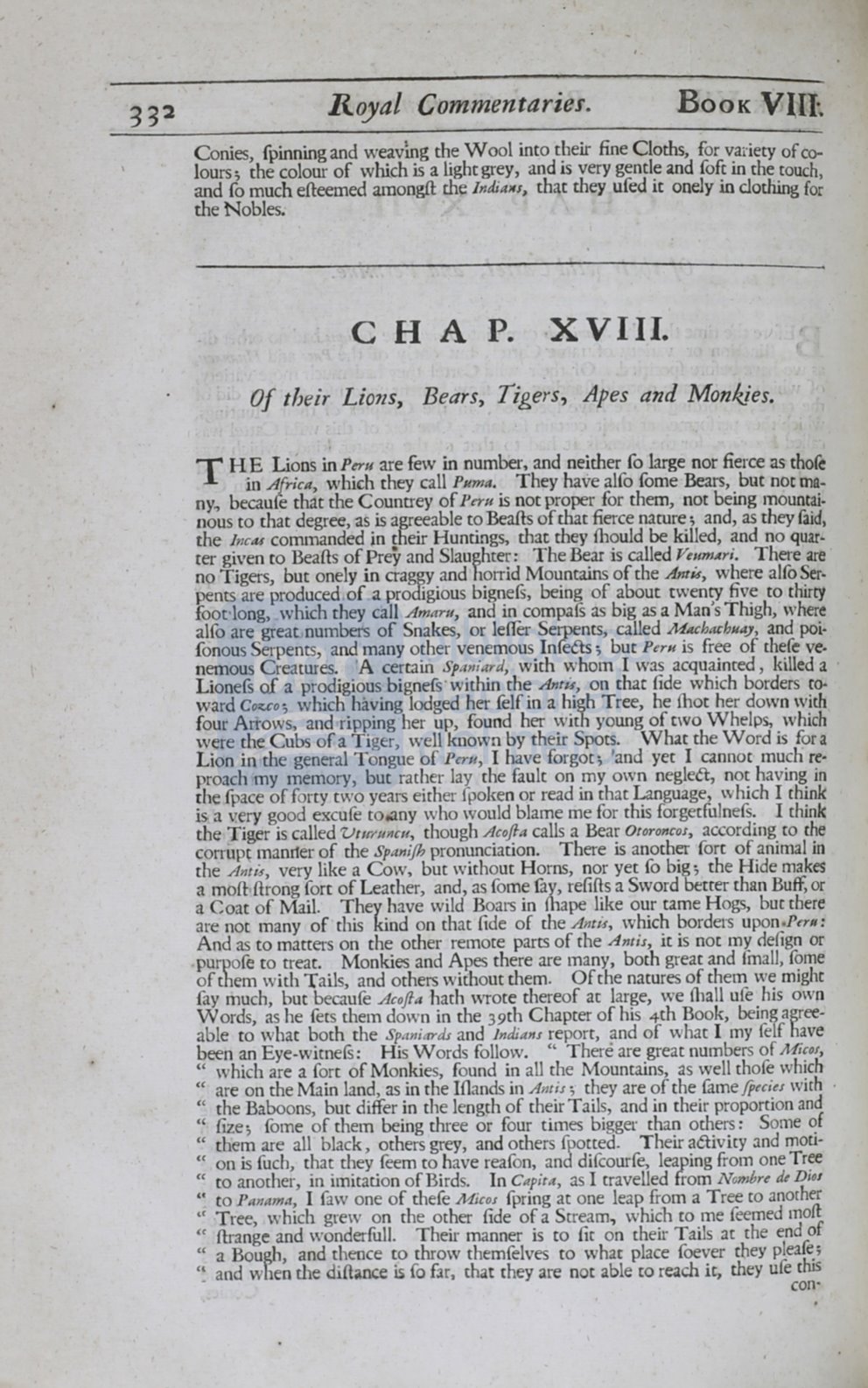

'·
Royal
Commentaries.
BooK
VIII:
Conies,
f
pinning
and
weaving the
W
col into their fine
Cloths, for
vadety
ofco–
lours;
the colour of
which
is
a
light grey,
and
is
very gentle and
fofc
in
the touch
and
fo
much
efteemed amongft
die
lntfJa11s,
that
they
ufed
it
onely
in
clothing
fo;
the Nobles.
C H A P.
:X VI
I
I.
Of their Lions, Bears, Tigers, Apes and Monk.Jes.
T
HE
Lions
in
Peru
are few
in
number,
and
neither fo large nor fierce
as thofe
in
.Africa,
whi~h
they call
Puma.
They have alfo fome Bears, but not ma...
ny., becaufe that the Counttey of
Peru
is
not proper
for
them, not being mountai–
nous
co
that degree,
as
is
agreeable to
Beafis
ofcl:lat fierce nature; and,
as
they faid,
the
JncM
commanded in dieir Huntings,
that
they iliould
be
killed, and no
quar..
ter
given to Beafis of Prey and Slaughter: The Bear is
called
Yeumari.
There
are
no Tigers, but onely
in
craggy and horrid Mountains of the
Antu,
where
alfo Ser·
pents are produced
of a
prodigious bignefs, being of about twenty
five
to
chircy
foot'long, which they call
Amaru,
and in compafs
as
big
as
a
Man's Thigh,
~here
alfo
are great numbers of Snakes, or leffer Serpents, called
MAchachuay,
and poi·
fonous Serpents,
and
many other venemous
Infe&;
but
Peru
is
free of chefe
ve..
nemous Creatures.
A
certain
Spaniard,
with whom
I
was
acquainted,
killed a
Lionefs of
a
prodifilous bignefs within the
Antu,
on that fide which borders
to·
ward
Co~co;
which having lodged her felf in
a
high Tree, he fhot her down with
four Arrows, and ripping her up, found her with young of two Whelps, which
were the Cubs of a Tiger, well known by their Spots. What the Word
is
for
a
Lion
in
the general Tongue of
Peru,
I
have forgot; 'and yet
I
cannot much
re–
proach my memory, but rather lay the fault on my own negleet,
not
having
in
the fpace of
forty
t~
o years either fpoken or read
in
that Language,
\I
hich I chink
is
a v.ery good excufe to.any who would blame me for
this
forgetfulne~.
I
think
the Tiger is called
Vt1rl'uncu,
though
Acoffa
calls a Bear
OtoroncoI,
ac
ording
co che
corrupt mant1er of the
Spanifh
pronunciation. There
is
another
fort
of animal
in
the
Antu,
very like a Cow, but without Horns, nor yet fo big; the Hide
makes
a
mofr firong
fort
of Leather, and, as fome
fay,
refifis
a
Sword better than Buff, or
a
...
oat of
Mail.
They have wild Boars in fhape like our tame Hogs, but
there
are not many of this
kind
on that fide of the
.Mtu,
which borders upon
Peru:
And
as
to matters on the other remote
parts
of the
Antis,
it is not
my
ciefign
or
purpofe to treat. Monkies and
Apes
there are many, both great and fmaU,
fome
of them
ith Tails, and others without them.
Of
the natures of them
~
e might
fay
much, but becaufe
Acoff
a
hath wrote thereof
at
large, we
fhall
ufe his own
Words,
as
he fets them down in the 39th Chapter
of
his
4th
Book, being
agree–
able to
bat
both the
Spaniards
and
Jndian1
report, and of what
I
my
[elf
have
been
an Eye-wirnefs: His Word follow.
'' There are great
numbers
of
Mico1,
'' \ hich are a fort ofMonkies,
found
in all the Mountains,
as
well thofe which
" are on the
Main
land,
as
in
the Wands in
Anti1
;
they are of the fame
fPeciu
with
" the Baboons, but differ
in
the length of their Tails and in their proportion
and
'
fize; fame of
them
being
three
or four times bigger than others
:
Some
of
cc
them are
all
black, others grey,
and
other [potted. Their aetiviry and
moti–
" on
is
fuch,
that they feem to have reafon, and difcourf
e,
leaping from one
Tree
" to another, in imitation ofBird .
In
Cllpita,
as
I
travelled from
Nombre
de
Djo1
" to
Panama,
I
faw one of thefe
Mico.r
firing
at one leap from a Tree to anorher
'' Tree, which grew on the
other
fide of
a cream, \
hich
co
me feemed
moft
' ftrange and wonderful}.
Their
manner
is
to
fie
on
their
Tails
at
the end
of
cc
a
Bough, and thence to throw themfelves
to
what place foever they
pleaf~;
'~
and
when the
ifiance
is
fo
far,
chat
they are
not able
to
reach
it,
they
ufe
this
con·














